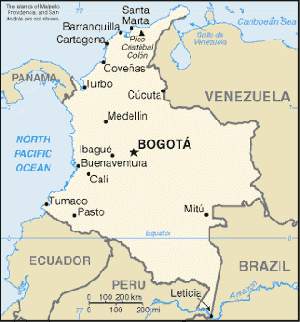Difference between revisions of "Bogotá (Colombia)"
| [unchecked revision] | [checked revision] |
GameoAdmin (talk | contribs) (CSV import - 20130820) |
AlfRedekopp (talk | contribs) m |
||
| (One intermediate revision by one other user not shown) | |||
| Line 1: | Line 1: | ||
| − | [[File:Colombia_map.gif|300px|thumb|right|''Colombia. World Factbook, 2005 | + | [[File:Colombia_map.gif|300px|thumb|right|''Colombia. World Factbook, 2005 '']] Bogotá, Colombia, the capital of the Republic of [[Colombia|Colombia]], is located on an extensive plateau on the eastern range of the Colombian Andes at an altitude of nearly 9,000 feet (2,700 meters). At the time of the conquest by the Spaniards in the 16th century, Bacatá (Bogotá), was one of the main seats of worship and government of the Chibcha people. In 2005, with a population of more than 7 million, Bogotá is the cultural, economic, and political center of the country. Like most Latin American cities, Bogotá is growing at a fast rate. Such population growth causes hardships for the already overburdened system of public services and housing. |
| − | |||
| − | '']] Bogotá, Colombia, the capital of the Republic of [[Colombia|Colombia]], is located on an extensive plateau on the eastern range of the Colombian Andes at an altitude of nearly 9,000 feet (2,700 meters). At the time of the conquest by the Spaniards in the 16th century, Bacatá (Bogotá), was one of the main seats of worship and government of the Chibcha | ||
The [[Iglesia Evangélica Menonita, Colombia |Iglesia Evangélica Menonita]] ([[General Conference Mennonite Church (GCM)|General Conference Mennonite Church]]) of Colombia began work in the city in January 1964. By 1986 three active Mennonite churches have emerged with a total membership of 417. The Centro Cristiano Menonita (Mennonite Christian Center), established in 1982, was an attractive three-story building located downtown, which houses the Teusaquillo Mennonite Church, a Mennonite bookstore, the Mennonite Development Foundation (MENCOLDES)<strong>, </strong>an audio-visual office, a Christian family agency, and the office of the church's executive secretary. Other Mennonite and Christian agencies use the Mennonite Christian Center for seminars, lectures, and other programs. | The [[Iglesia Evangélica Menonita, Colombia |Iglesia Evangélica Menonita]] ([[General Conference Mennonite Church (GCM)|General Conference Mennonite Church]]) of Colombia began work in the city in January 1964. By 1986 three active Mennonite churches have emerged with a total membership of 417. The Centro Cristiano Menonita (Mennonite Christian Center), established in 1982, was an attractive three-story building located downtown, which houses the Teusaquillo Mennonite Church, a Mennonite bookstore, the Mennonite Development Foundation (MENCOLDES)<strong>, </strong>an audio-visual office, a Christian family agency, and the office of the church's executive secretary. Other Mennonite and Christian agencies use the Mennonite Christian Center for seminars, lectures, and other programs. | ||
Latest revision as of 20:17, 25 January 2023
Bogotá, Colombia, the capital of the Republic of Colombia, is located on an extensive plateau on the eastern range of the Colombian Andes at an altitude of nearly 9,000 feet (2,700 meters). At the time of the conquest by the Spaniards in the 16th century, Bacatá (Bogotá), was one of the main seats of worship and government of the Chibcha people. In 2005, with a population of more than 7 million, Bogotá is the cultural, economic, and political center of the country. Like most Latin American cities, Bogotá is growing at a fast rate. Such population growth causes hardships for the already overburdened system of public services and housing.
The Iglesia Evangélica Menonita (General Conference Mennonite Church) of Colombia began work in the city in January 1964. By 1986 three active Mennonite churches have emerged with a total membership of 417. The Centro Cristiano Menonita (Mennonite Christian Center), established in 1982, was an attractive three-story building located downtown, which houses the Teusaquillo Mennonite Church, a Mennonite bookstore, the Mennonite Development Foundation (MENCOLDES), an audio-visual office, a Christian family agency, and the office of the church's executive secretary. Other Mennonite and Christian agencies use the Mennonite Christian Center for seminars, lectures, and other programs.
Three other Anabaptist-related groups had come to work in the city by 1986: the Asociación de Iglesias Hermanos Menonitas (Mennonite Brethren), the Comunidad Cristiana Hermandad de Cristo (Brethren in Christ), and the Iglesia Colombiana de los Hermanos (related to the Brethren Church, Ashland, Ohio). There was a National Anabaptist Committee which cooperated on specific issues, e.g., voluntary service programs, conscientious objection, and Anabaptist identity.
| Author(s) | Hector G Valencia V |
|---|---|
| Date Published | 1986 |
Cite This Article
MLA style
Valencia V, Hector G. "Bogotá (Colombia)." Global Anabaptist Mennonite Encyclopedia Online. 1986. Web. 3 Feb 2026. https://gameo.org/index.php?title=Bogot%C3%A1_(Colombia)&oldid=174622.
APA style
Valencia V, Hector G. (1986). Bogotá (Colombia). Global Anabaptist Mennonite Encyclopedia Online. Retrieved 3 February 2026, from https://gameo.org/index.php?title=Bogot%C3%A1_(Colombia)&oldid=174622.
Adapted by permission of Herald Press, Harrisonburg, Virginia, from Mennonite Encyclopedia, Vol. 5, p. 89. All rights reserved.
©1996-2026 by the Global Anabaptist Mennonite Encyclopedia Online. All rights reserved.

